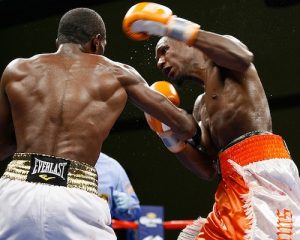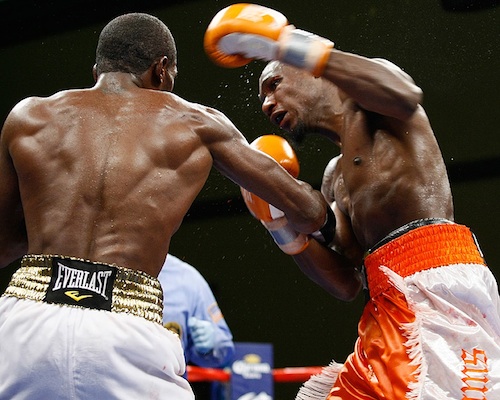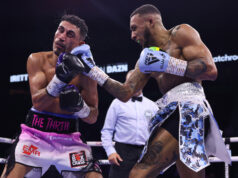After the Williams-Lara decision, a lot of accusations were thrown around by fans and people in the sport grasping for explanations for such a poor decision. It’s been a rough patch in this regard—with a seemingly unending series of decisions that range from curious to unfathomable. Just in the past few weeks, we saw ugly scores from Germany in the Felix Sturm vs. Matthew Macklin, from St. Louis with Devon Alexander vs. Lucas Matthysse, and now the Williams-Lara fiasco.
On the surface, one might write it off as mere incompetence. Maybe these judges were having an off night. Perhaps they saw different fights from ringside than what we saw from our televisions. Maybe the hometown crowd swayed them.
But when that incompetence always benefits the bigger-name guy, then it must be corruption. When bad scoring exclusively benefits the “meal ticket,” then what other conclusion is available?
Sturm-Macklin and Alexander-Matthysse were somewhat close fights, but ones where the loser appeared to win. A case can be made for why those decisions are not robberies, but fans that say that are part of the problem. Whether those decisions fulfill our definitions of a robbery is unimportant. The point is that those decisions ALWAYS go in favor of the guy who is either a hometown product or the more marketable fighter. Every single time.
If incompetence were the only issue here, some of those iffy decisions would be going to the unsung guy—or at least 1 out of 50 times. The fact that these decisions serve as lifelines for the big-name fighter 100% of the time suggests something more sinister.
Corruption is almost impossible to prove. No one is likely to provide proof of pay-offs anytime soon. But when 3 judges score a fight in a way that no other people agree with, then what else are we supposed to think? Go find me a room where there were 3 people—all of whom did not feel Lara won the fight. You won’t be able to do it. Are we supposed to believe the only living human who had Williams beating Lara 116-114 just happened to be a judge? Well that would be quite the coincidence, wouldn’t it?

Now I hear some people talking about how Paul Williams might have taken some rounds with his volume punching. Or maybe we were swayed by the alarmist HBO commentating, where they feared for Williams’ very life. Or maybe we neglected to notice the rounds where Lara was coasting. Maybe there is some truth to that.
Nevertheless, this is professional boxing, where clean punching wins the day—not merely moving your hands. Hats off to Williams for at least being able to give the impression that he was in the fight. The Punchstat numbers were not that lopsided in Lara’s favor. But let’s face it: the 50 most impressive and telling shots in the fight were all landed by Lara.
Imagine for a moment if the roles were reversed—if it were Lara throwing a bunch of meaningless punches with Williams rocking Lara’s head like a speedbag round after round. It would have been 119-110 Williams. Lara would have received no credit for his work. No one would have tried to make a case for him. So why do it with Williams?
Why should the less-ballyhooed fighter have to win by such a large indisputable margin, while you merely need to “make a case” for the big-name fighter? You don’t ever find yourself having to make that same case for the guy you wouldn’t have predicted would be the recipient of such generosity. The fighter that figures to benefit from shenanigans is always the one who receives the favorable treatment. How can that be the case without the presence of corruption?
Watch a close fight between, say, a popular HBO fighter and a more obscure fighter. Whenever you hear the ring announcer begin to announce scores that suggest a one-sided fight, you can bet the verdict will go to the better-known guy. 95% of the time? No—every single time.
Boxing has a built-in bias and we all understand that. Hometown guys getting decisions they don’t deserve and big-ticket fighters getting a break is part of the game. But there’s an invisible line in the sand, isn’t there? We’re used to well-known fighters who lost 6 out of 10 rounds getting the decision. But when a fighter clearly wins 8 of 12 rounds, it’s an insult to all of us to deny him his rightful victory. That’s going too far.
Don’t think this doesn’t hurt the sport. Maybe a future heavyweight champion who saw Lara get hoodwinked said “to hell with boxing.” After watching boxing for the past few weeks, one is left thinking that unless the marquee fighter is utterly and thoroughly dominated or knocked out, he will win a decision. Sturm, Alexander, and Williams might have done enough to make the fights close, but so what? Is a close win not a win? Is making a case for how a fighter kept it close necessarily a viable argument for why he deserved to win?
Imagine if in baseball, a team had to win by 4 runs to get a win. Or if a basketball team had to win by double-digits to secure a victory? I’m a bit mystified why I hear so many people trying to illustrate how these were close fights. Losing closely is still losing. Even if I try to give Williams every benefit of the doubt and give him 5 rounds, it’s still a losing effort. Whether I give him 2 rounds or 5 rounds in no way makes giving him 8 rounds more palatable or in any way acceptable.
We know what the powers-that-be want in a given fight. Powerful promoters, managers, and networks all wanted Chavez, Jr. to beat Zbik. They wanted Alexander to beat Matthysse and Sturm to beat Macklin. The powers were hoping Williams would win. That’s all fine. But when the judges are not freed up from these external considerations, it can kill the sport. Why does it seem that judges have a vested stake in this, as if they’re looking out for the interests of people who bankroll the sport?
When the scores of judges begin to exclusively reflect the financial considerations of bigwigs in the sport, then we have a major problem. One might have been willing to look the other way if the 3-11 pug who clearly bests the 8-0 prospect would get the decision 1 out of 100 times. Or if the unsung foreigner got the nod once every decade in a close fight against a better-known fighter. But that never happens, so we shouldn’t be looking the other way anymore.
Maybe I’m a paranoid man who thinks the world is out to get him. Maybe some things happened in my life that leave me a little skeptical when it comes to the truthfulness of others. But either I’m crazy or there’s something quite unreasonable going on here. The days of judges seemingly phoning in their scores from the craps table needs to stop. We are all tiring rapidly of watching fighters win a bout, only to be victimized by unfathomable tallies from judges who can’t possibly be operating objectively on any level.
The results of the past few weeks almost beg those who feel like they are keepers of the sport to step up and object. If left unchecked, this could spiral out of control—with a long period of results that appear to have no reflection on what people are seeing in the ring. It’s bad for the sport on every level imaginable.











